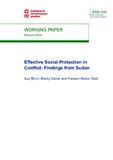Effective Social Protection in Conflict: Findings from Sudan
| dc.contributor.author | Birch, Izzy | |
| dc.contributor.author | Carter, Becky | |
| dc.contributor.author | Satti, Hassan-Alattar | |
| dc.coverage.spatial | Sudan | en |
| dc.date.accessioned | 2024-02-21T16:37:29Z | |
| dc.date.available | 2024-02-21T16:37:29Z | |
| dc.date.issued | 2024-02-21 | |
| dc.identifier.citation | Birch, I.; Carter, B. and Satti, H-A. (2024) Effective Social Protection in Conflict: Findings from Sudan, Working Paper, Brighton: Institute of Development Studies, DOI: 10.19088/IDS.2024.011 | en |
| dc.identifier.isbn | 978-1-80470-178-2 | |
| dc.identifier.uri | https://opendocs.ids.ac.uk/opendocs/handle/20.500.12413/18235 | |
| dc.description.abstract | This paper explores the conflict sensitivity of social protection in Sudan in its various forms since the present war started in April 2023, from locally led mutual aid to the social assistance programming of international agencies. It considers how these various interventions are both responding to, and being changed by, the conflict and associated humanitarian crisis, as well as how they interrelate. Provision of social assistance leans heavily on humanitarian actors for now, and lessons from their practice may inform and enrich a future state-led social protection system when this is rebuilt. Conflict sensitivity principles can be introduced through a number of entry points, then woven through the project cycle and the social protection delivery chain; they include systems of analysis, monitoring, and accountability to affected people, as well as capacity for adaptive management. Donors can reinforce this through their partnership, financing, and risk management strategies. Above all, external actors should recognise the fundamental importance of community-led crisis response and deepen their understanding of how it functions, and of the concerns and priorities of those involved. | en |
| dc.description.sponsorship | Irish Aid, Government of Ireland | en |
| dc.language.iso | en | en |
| dc.publisher | Institute of Development Studies | en |
| dc.relation.ispartofseries | Working Paper; | |
| dc.rights | This is an Open Access paper distributed under the terms of the Creative Commons Attribution Non Commercial 4.0 International licence (CC BY-NC), which permits use, distribution, and reproduction in any medium, provided the original authors and source are credited, any modifications or adaptations are indicated, and the work is not used for commercial purposes. | en |
| dc.rights.uri | http://creativecommons.org/licenses/by-nc/4.0/ | en |
| dc.subject | Security and Conflict | en |
| dc.subject | Social Protection | en |
| dc.title | Effective Social Protection in Conflict: Findings from Sudan | en |
| dc.type | Series paper (IDS) | en |
| dc.rights.holder | Institute of Development Studies | en |
| dc.identifier.team | Rural Futures | en |
| dc.identifier.doi | 10.19088/IDS.2024.011 | |
| dcterms.dateAccepted | 2024-02-21 | |
| rioxxterms.funder | Default funder | en |
| rioxxterms.identifier.project | Default project | en |
| rioxxterms.version | VoR | en |
| rioxxterms.versionofrecord | 10.19088/IDS.2024.011 | en |
| rioxxterms.funder.project | e4b8632d-62dd-4f31-9936-43860ac26f9a | en |
Files in this item
This item appears in the following Collection(s)
Except where otherwise noted, this item's license is described as This is an Open Access paper distributed under the terms of the Creative Commons Attribution Non Commercial 4.0 International licence (CC BY-NC), which permits use, distribution, and reproduction in any medium, provided the original authors and source are credited, any modifications or adaptations are indicated, and the work is not used for commercial purposes.


